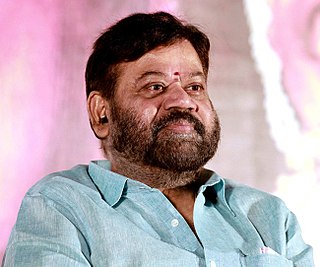A Quote by P. Vasu
Rajinikanth is a man of perfection and he knows what to give his audiences.
Related Quotes
God wanted man to know him somehow through his creatures, and since no creature could fittingly reflect the infinite perfection of the Creator, he multiplied his creatures and gave a certain goodness and perfection to each of them so that from them we could judge the goodness and perfection of the Creator, who embraces infinite perfection in the perfection of his one and utterly simple essence.
There are four types of men in this world: 1. The man who knows, and knows that he knows; he is wise, so consult him. 2. The man who knows, but doesn't know that he knows; help him not forget what he knows. 3. The man who knows not, and knows that he knows not; teach him. 4. Finally, there is the man who knows not but pretends that he knows; he is a fool, so avoid him.
All of man's ills are due to his lack of knowing God within him. The perfection of God's universe is founded upon its perfection of Balance. All of man's ills are caused by toxic poisons generated in his body through unbalance affecting his power of control over the functions of his electric body. Man, as an extension of God, is creator of his own electric body. He is master of his electric body to the extent of his knowing the Light of God in him. ... God says to man: »What I do, ye shall do«, but man is unbelieving for long ages.
Give me a young man who has kept himself morally clean and has faithfully attended his church meetings. Give me a young man who has magnified his priesthood and has earned the Duty of God Award and is an Eagle Scout. Give me a young man who is a Seminary graduate and has a burning testimony of the Book of Mormon. Give me such a young man, and I will give you a young man who can perform miracles for the Lord in the mission field and throughout his life.
Man... knows only when he is satisfied and when he suffers, and only his sufferings and his satisfactions instruct him concerning himself, teach him what to seek and what to avoid. For the rest, man is a confused creature; he knows not whence he comes or whither he goes, he knows little of the world, and above all, he knows little of himself.
A man’s ignorance sometimes is not only useful, but beautiful - while his knowledge, so called, is oftentimes worse than useless, besides being ugly. Which is the best man to deal with - he who knows nothing about a subject, and, what is extremely rare, knows that he knows nothing, or he who really knows something about it, but thinks that he knows all?
Always remember deep in your heart that all is well and everything is unfolding as it should. There are no mistakes anywhere, at any time. What appears to be wrong is simply your own false imagination. That's all. But we live in a universe of Brahman, of Absolute Reality, self -contained Consciousness, where there's perfection, perfect life, perfect bliss, perfect being. That perfection knows nothing about wrong and right, good and bad, happy and sad. It knows only itself as Perfection. And you are That.
When a man's life is over, it remains true that he was one sort of man and not another. A man who understands himself under the form of eternity knows the quality that eternally belongs to him, and knows that he cannot wholly die, even if he would, for when the movement of his life is over, the truth of his life remains.
The truly educated man is not a man who knows a bit of everything, not even the man who knows all the details of all subjects (if such a thing were possible): the “whole man” in fact, may have little detailed knowledge of facts and theories...but he will be truly in touch with the centre. He will not be in doubt about his basic convictions, about his view on the meaning and purpose of his life. He may not be able to explain these matters in words, but the conduct of his life will show a certain sureness of touch which stems from this inner clarity.
In this state one enriches everything out of one's own fullness: whatever one sees, whatever wills is seen swelled, taut, strong, overloaded with strength. A man in this state transforms things until they mirror his power—until they are reflections of his perfection. This having to transform into perfection is—art.






































